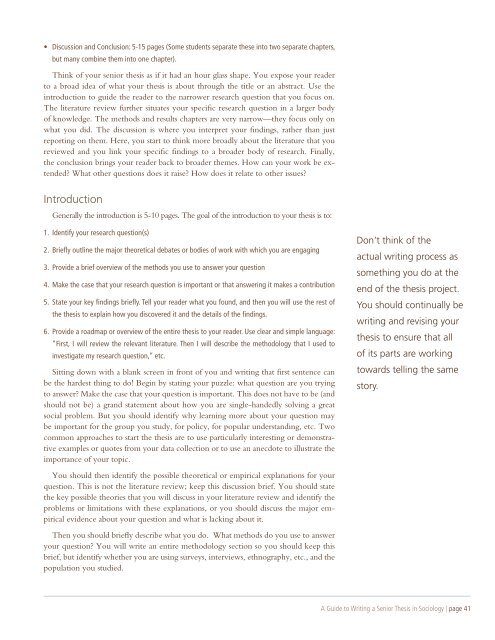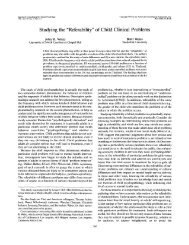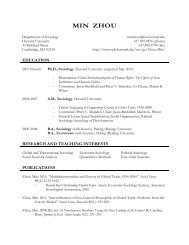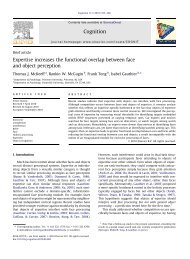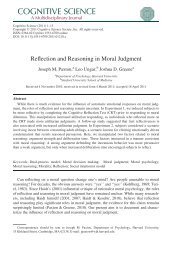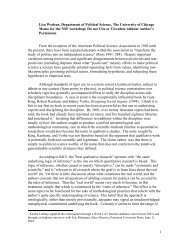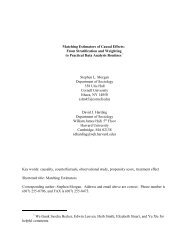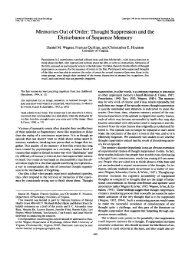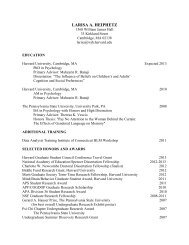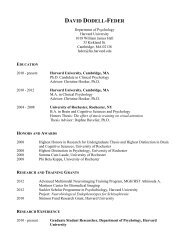A Guide to Writing a Senior Thesis in Sociology - WJH Home Page ...
A Guide to Writing a Senior Thesis in Sociology - WJH Home Page ...
A Guide to Writing a Senior Thesis in Sociology - WJH Home Page ...
You also want an ePaper? Increase the reach of your titles
YUMPU automatically turns print PDFs into web optimized ePapers that Google loves.
• Discussion and Conclusion: 5-15 pages (Some students separate these <strong>in</strong><strong>to</strong> two separate chapters,<br />
but many comb<strong>in</strong>e them <strong>in</strong><strong>to</strong> one chapter).<br />
Th<strong>in</strong>k of your senior thesis as if it had an hour glass shape. You expose your reader<br />
<strong>to</strong> a broad idea of what your thesis is about through the title or an abstract. Use the<br />
<strong>in</strong>troduction <strong>to</strong> guide the reader <strong>to</strong> the narrower research question that you focus on.<br />
The literature review further situates your specific research question <strong>in</strong> a larger body<br />
of knowledge. The methods and results chapters are very narrow—they focus only on<br />
what you did. The discussion is where you <strong>in</strong>terpret your f<strong>in</strong>d<strong>in</strong>gs, rather than just<br />
report<strong>in</strong>g on them. Here, you start <strong>to</strong> th<strong>in</strong>k more broadly about the literature that you<br />
reviewed and you l<strong>in</strong>k your specific f<strong>in</strong>d<strong>in</strong>gs <strong>to</strong> a broader body of research. F<strong>in</strong>ally,<br />
the conclusion br<strong>in</strong>gs your reader back <strong>to</strong> broader themes. How can your work be extended?<br />
What other questions does it raise? How does it relate <strong>to</strong> other issues?<br />
Introduction<br />
Generally the <strong>in</strong>troduction is 5-10 pages. The goal of the <strong>in</strong>troduction <strong>to</strong> your thesis is <strong>to</strong>:<br />
1. Identify your research question(s)<br />
2. Briefly outl<strong>in</strong>e the major theoretical debates or bodies of work with which you are engag<strong>in</strong>g<br />
3. Provide a brief overview of the methods you use <strong>to</strong> answer your question<br />
4. Make the case that your research question is important or that answer<strong>in</strong>g it makes a contribution<br />
5. State your key f<strong>in</strong>d<strong>in</strong>gs briefly. Tell your reader what you found, and then you will use the rest of<br />
the thesis <strong>to</strong> expla<strong>in</strong> how you discovered it and the details of the f<strong>in</strong>d<strong>in</strong>gs.<br />
6. Provide a roadmap or overview of the entire thesis <strong>to</strong> your reader. Use clear and simple language:<br />
“First, I will review the relevant literature. Then I will describe the methodology that I used <strong>to</strong><br />
<strong>in</strong>vestigate my research question,” etc.<br />
Sitt<strong>in</strong>g down with a blank screen <strong>in</strong> front of you and writ<strong>in</strong>g that first sentence can<br />
be the hardest th<strong>in</strong>g <strong>to</strong> do! Beg<strong>in</strong> by stat<strong>in</strong>g your puzzle: what question are you try<strong>in</strong>g<br />
<strong>to</strong> answer? Make the case that your question is important. This does not have <strong>to</strong> be (and<br />
should not be) a grand statement about how you are s<strong>in</strong>gle-handedly solv<strong>in</strong>g a great<br />
social problem. But you should identify why learn<strong>in</strong>g more about your question may<br />
be important for the group you study, for policy, for popular understand<strong>in</strong>g, etc. Two<br />
common approaches <strong>to</strong> start the thesis are <strong>to</strong> use particularly <strong>in</strong>terest<strong>in</strong>g or demonstrative<br />
examples or quotes from your data collection or <strong>to</strong> use an anecdote <strong>to</strong> illustrate the<br />
importance of your <strong>to</strong>pic.<br />
You should then identify the possible theoretical or empirical explanations for your<br />
question. This is not the literature review; keep this discussion brief. You should state<br />
the key possible theories that you will discuss <strong>in</strong> your literature review and identify the<br />
problems or limitations with these explanations, or you should discuss the major empirical<br />
evidence about your question and what is lack<strong>in</strong>g about it.<br />
Then you should briefly describe what you do. What methods do you use <strong>to</strong> answer<br />
your question? You will write an entire methodology section so you should keep this<br />
brief, but identify whether you are us<strong>in</strong>g surveys, <strong>in</strong>terviews, ethnography, etc., and the<br />
population you studied.<br />
Don’t th<strong>in</strong>k of the<br />
actual writ<strong>in</strong>g process as<br />
someth<strong>in</strong>g you do at the<br />
end of the thesis project.<br />
You should cont<strong>in</strong>ually be<br />
writ<strong>in</strong>g and revis<strong>in</strong>g your<br />
thesis <strong>to</strong> ensure that all<br />
of its parts are work<strong>in</strong>g<br />
<strong>to</strong>wards tell<strong>in</strong>g the same<br />
s<strong>to</strong>ry.<br />
A <strong>Guide</strong> <strong>to</strong> <strong>Writ<strong>in</strong>g</strong> a <strong>Senior</strong> <strong>Thesis</strong> <strong>in</strong> <strong>Sociology</strong> | page 41


